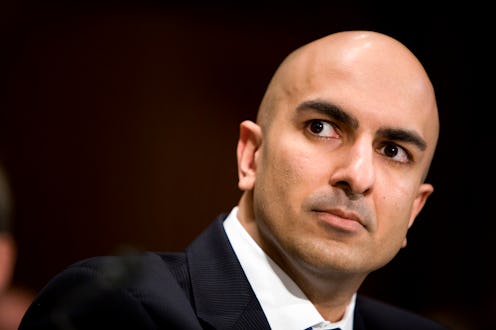News
The Problem With His "Homelessness" Stunt
How many homeless multi-millionaires have you met? If you were driving the streets of Fresno, California recently, you may have seen one without realizing it. That's because GOP California Gubernatorial candidate Neel Kashkari spent a week living like he was homeless, as part of his campaign push against incumbent Democrat Jerry Brown. Kashkari's week-long brush with homelessness could either be seen as an eye-opening and illuminating gesture, or a misguided and grossly political stunt, depending on your perspective. But, really, are those two things mutually exclusive?
According to Kashkari's account in his Wall Street Journal op-ed, he hopped a bus from Los Angeles to Fresno — it's not explained why he felt the need to leave the city for this — with a mere $40, one spare set of clothes, and a toothbrush on hand. When he arrived, he set about trying to find work, assuming that as "an able-bodied 41-year-old," "Surely I could find some work."
But what Kashkari actually recounts is a story not altogether surprising — his inability to find work, his dependence on a homeless shelter to get meals, his encounters with "proud," real members of the homeless community.
The people I met during my week in Fresno are proud. They don't want to be homeless. They don't want to be poor. They don't want to depend on a shelter or the state. Most want jobs but simply cannot find one.
As you may have suspected, there are a few things about this stunt that are deeply problematic. Moreover, the entire idea is shot-through with a questionable moral sensibility.
In the first place, as is also true of the "SNAP Challenge," playing poor for a week or even a month doesn't begin to approach enduring that lifestyle indefinitely. Kashkari has millions in the bank, and according to the Los Angeles Times, lives in a home in upscale Laguna Beach. Kashkari was, at best, living a limp imitation of the true struggle of homelessness, and only for one week. He can slum all he wants, but he knows he's headed home in a few days, and for actually homeless people, that comforting knowledge doesn't exist.
This is true regardless of how sincerely he might have meant it, which, considering the entire thing is part of an active campaign against Brown, is an entirely open question. As The Daily Banter points out, for an ex-Goldman Sachs executive and bank bailout architect to court everyman status is a bit of a reach.
Further, Kashkari claims he was eating meals at a homeless shelter — meals which would've been better served to a non-millionaire, perchance? But perhaps most troubling of all is the conclusion he arrives at, amid a tiring fifth day of unsuccessful job-hunting — that the experience actually reaffirmed his faith in traditional Republican talking points on poverty.
I walked for hours and hours in search of a job, giving me a lot of time to think. Five days into my search, hungry, tired and hot, I asked myself: What would solve my problems? Food stamps? Welfare? An increased minimum wage?
No. I needed a job. Period. Like others, I have often said the best social program in the world is a good job. Even though my homeless trek was only for a week, with a defined endpoint, that statement became much more real for me. A job was the one thing that could have solved my food, housing and transportation problems.
Five days of struggle, tired and hot, and also hungry. What, are food stamps going to help this? Of course not, just find a job. Kashkari's ultimate conclusion is that what he believed all along, and has "often said" in the past, is actually proven by his weeklong stint of faux poverty. Which tells you about all you need to know about the value of his demonstration — he gets to bill himself as a selfless man of the people, all while not having to reconsider his views or change his existing policy positions.
Some questions for Kashkari:
- What if there's a homeless person who simply can't find a job, as you couldn't — someone suffering from addiction or chronic mental illness, for example, an adversity you didn't face. Wouldn't welfare help that person? And even if you don't like the idea, isn't it sort of a moral necessity?
- You claimed your job search was hurt by the fact that you had to return to the shelter for all your meals. Wouldn't food stamps help with that?
- Do you think the "kindhearted" homeless community of Fresno would've been so kind if they knew you were secretly a multi-millionaire, anti-welfare Republican running for political office?
- Didn't this feel even a little exploitive?
Images: Neel Kashkari/YouTube
